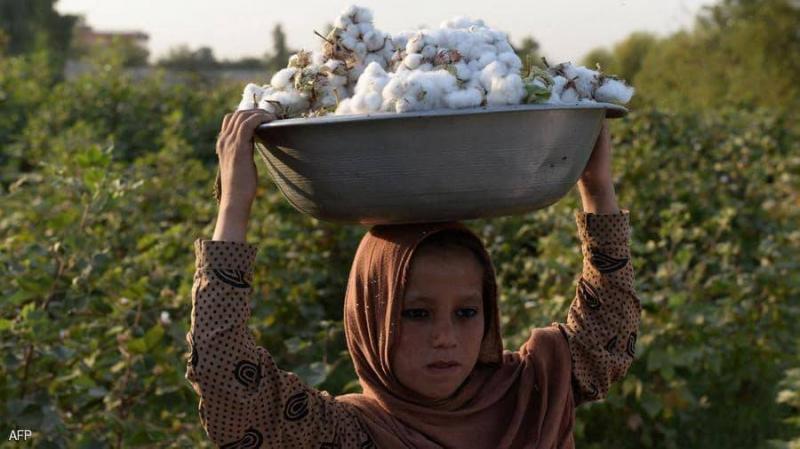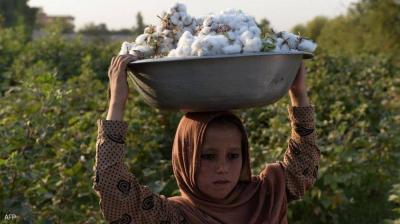Syria's cotton farming sector is experiencing a sharp decline in productivity, as the country is now classified among the world's poorest nations. Before the Syrian crisis, the agricultural and industrial sectors relied heavily on what is referred to as "white gold" as one of the key economic sources. This resource was a vital asset for the national treasury before the country was engulfed in the flames of war, poverty, insecurity, and waves of drought and desertification that have rendered thousands of hectares of agricultural land unproductive. The war has led to the migration of farmers, the shutdown of some cotton gins and spinning factories, and various cotton-related industries, resulting in unemployment for workers following the destruction of infrastructure and the emigration of industrialists.
Syria's production of its white gold depends on its agricultural basket in the eastern and northern provinces such as Deir ez-Zor, Raqqa, and the Syrian Al-Jazira region, where agricultural conditions are favorable. According to Zuhair Jad'an, a thirty-something farmer from the town of Bou Hassan in the Deir ez-Zor countryside, Deir ez-Zor is distinguished by its extensive productive capabilities for growing Syria's white oil due to the availability of vast agricultural areas and the flow of the Euphrates River for irrigation.
However, as Jad'an explains to Sky News Arabia, the province is targeted by terrorist operations executed by ISIS's sleeper cells. Moreover, the periodic restriction of Euphrates River water by Turkey has contributed to declining cotton harvests. He added, "Farmers in the province are facing significant challenges due to the collapse of the Syrian pound, marketing difficulties, ISIS threats to farmers, and drought... all these factors together have placed the future of white gold in jeopardy."
The government's pricing of agricultural purchases, including cotton, has caused discontent among farmers in most Syrian provinces, as they buy their agricultural inputs in foreign currency, while sales to government institutions are made in the devalued Syrian pound, as agricultural engineer Ali Ghalis from Raqqa points out. He noted to Sky News Arabia, "Farmers purchase fertilizers, seeds, and pesticides in dollars, while government institutions and others affiliated with the autonomous administration set crop purchase prices in the fluctuating Syrian pound. Faced with such devastating losses, farmers are forced to abandon their lands in search of new means of livelihood."
This year, the government economic committee raised the price of a kilogram of cotton to 2,500 Syrian pounds (with the dollar at 3,600 Syrian pounds), having set it at 1,500 Syrian pounds in March. This will not compensate farmers for their losses, according to Jad'an, who stated, "The Syrian government and the autonomous administration need to set prices in dollars to help us recover our losses."
Before the crisis in 2011, Syria ranked highly in global cotton production and export. However, for the first time in its history after the crisis, it announced it would import cotton to keep its factories operating. A few days ago, the government economic committee allowed the public sector and industrialists to import cotton threads and ginned cotton as an emergency solution following the exit of wheat harvests from self-sufficiency due to the droughts experienced this year and the import of wheat from Russia. This was followed by a similar decision to import cotton, marking Syria's transition from a cotton-exporting and producing country to an importer.
Dr. Zuhair Shams, an expert in economic affairs, reported that before 2011, Syria ranked second globally in the organic cotton textile production market, significantly contributing to global production. He mentioned to Sky News Arabia, "Sixty-five percent of Syrian textile exports before the crisis went to Western European countries." He added, "In 2010, the volume of cotton stock reached 15 billion Syrian pounds, comprising 62% of the total textile industries' stock, and 66% of the total stock of textile products in the public sector."
He further stated that the damage inflicted on factories, plants, and cotton gins, as well as the fragmentation of the provinces from the capital, Damascus, due to the actions of terrorist organizations, particularly ISIS, which took control of several agricultural cities in Syria, led to a complete economic collapse.
Shams pointed out that ISIS sleeper cells continue to threaten farmers, forcing them to pay extortion fees. Additionally, they often seize trucks carrying supplies such as seeds, fertilizers, and pesticides entering Deir ez-Zor, Raqqa, Hamah countryside, Sweida, and Al-Jazira province. Moreover, executions of merchants, farmers, and agricultural institution employees are sometimes carried out, creating terror among farmers who abandon their livelihoods and crops, fleeing to safer areas for fear of their lives, leaving fields now threatened by desertification and drought.




